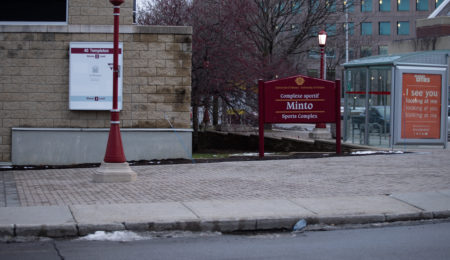This is the second student death to occur this semester, the sixth in the past year
Content warning: Student death
A University of Ottawa student was found dead in one of the school’s on-campus residences on Saturday, the school’s administration says. The death is not linked to the COVID-19 pandemic.
“At this difficult time when our hearts are already burdened, I deeply regret that I must share news that is sure to weigh them down further,” wrote U of O president Jacques Frémont in a media statement on Saturday night.
“I know that this news will be deeply upsetting to the U of O community, as it most certainly is to me.”
This is the second student death to occur this semester, and the sixth in the past year.
“The loss of a promising young life is an inexpressible tragedy,” wrote Frémont. “We mourn this student’s death as a caring community, and we mourn as individuals who have each known despair and loss.”
In February, Frémont acknowledged that the school is facing a mental health ‘crisis’. Prior to this announcement, a wave of students and thousands of petition signers demanded better mental health services from the university in December.
In this semester alone, a number of protests and demonstrations calling on the administration to improve mental health services have been organized by students.
A February town hall on mental health saw students, staff and faculty members voice their experiences and concerns with the school’s mental health system. Several students spoke about the lack of intersectional resources and diversity in staff when reaching out for help, while professors echoed students’ recommendations for the school to take a holistic and systematic approach to mental health.
The U of O has struck a mental health task force, which is looking to implement a number of recommendations from a January report on mental health and wellness at the school.
“To you I say: You are not alone. You are among friends and people who care deeply about you. I care about each of you, and so do your fellow students and your professors,” Frémont wrote in his statement.
He urged students to stay in touch with their family and friends, and to reach out for help if they need it.
“If you are struggling or feel you have no one to turn to, please speak to your residence advisor, or visit one of our campus mental health counsellors,” he wrote. “Check in with each other. Be there for each other. We will always need each other, and we must always care for one another.”
A non-comprehensive list of local mental health resources appears below…
On campus…
- University of Ottawa Health Services (UOHS), 100 Marie-Curie Private
- Offers counselling, psychiatric services, individual, couple or family therapy, access to psycho-educational groups and referrals to specialists off-campus
- Student Academic Success Service (SASS), 100 Marie-Curie Private
- Offers individual counselling, peer-counselling, workshops, online therapy and group counselling using new stepped model; referrals
- Faculty mentoring centres (locations differ by faculty)
- Specialized mentoring services catered to the needs of students in each faculty
Off campus…
- Mental health hotlines…
- Drugs and Alcohol Helpline: 1-866-531-2600
- Canada Suicide Prevention Service phone available 24/7: 1-833-456-4566
- Fem’aide: 1-877-336-2433
- Good2Talk: 1-866-925-5454
- Kids Help Phone: 1-800-668-6668 or text CONNECT to 686868
- Mental Health Crisis Line: 613-722-6914
- Distress Centre of Ottawa and Region: (613) 238-3311
- Ottawa Rape Crisis Centre: 613-562-2333
- Tel-Aide Outaouais: 613-741-6433
- Trans Life Line: 1-877-330-6366
- Walk-in counselling clinics (six Ottawa locations)…
- Somerset West Community Health Centre (55 Eccles Street)
- South-East Ottawa Community Health Centre (1355 Bank Street)
- Family Services Ottawa (312 Parkdale Avenue)
- Jewish Family Services of Ottawa (300-2255 Carling Avenue)
- Ottawa Community Immigrant Services Organization(959 Wellington St. W)
- CFS/SFC Ottawa (310 Olmstead Road)
- Community health and resource centres (13 in Ottawa)
- Carlington Community Health Centre (900 Merivale Road)
- Eastern Ottawa Resource Centre (215-1980 Ogilvie Road)
- Nepean, Rideau and Osgoode Community Resource Centre (1547 Merivale Road, Unit 240)
- Rideau-Rockcliffe Community Health Centre (225 Donald Street)
- Sandy Hill Community Health Centre (221 Nelson Street)
- South East Ottawa Community Health Centre (1355 Bank Street)
- Western Ottawa Community Resource Centre (2 MacNeil Court)
- Centretown Community Health Centre (420 Cooper Street)
- Lowertown Community Resource Centre (40 Cobourg Street)
- Orleans-Cumberland Community Health Centre (240 Centrum Boulevard)
- Pinecrest-Queensway Community Health Centre(1365 Richmond Road)
- Somerset West Community Health Centre (55 Eccles Street)
- Vanier Community Service Centre (270 Marier Avenue)
Warning signs of suicide include:
Talking about wanting to die
Looking for a way to kill oneself
Talking about feeling hopeless or having no purpose
Talking about feeling trapped or being in unbearable pain
Talking about being a burden to others
Increasing use of alcohol or drugs
Acting anxious, agitated, or recklessly
Sleeping too little or too much
Withdrawing or feeling isolated
Showing rage or talking about seeking revenge
Displaying extreme mood swings
The more of these signs a person shows, the greater the risk. If you suspect someone you know may be contemplating suicide, you should talk to them, according to the Canadian Association for Suicide Prevention.





